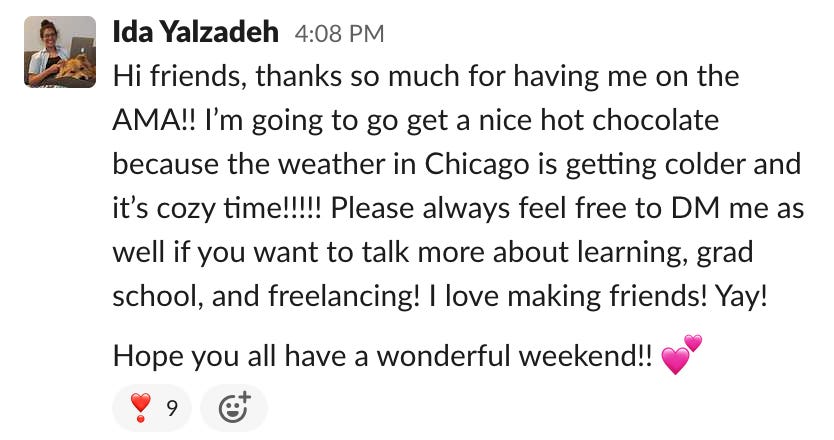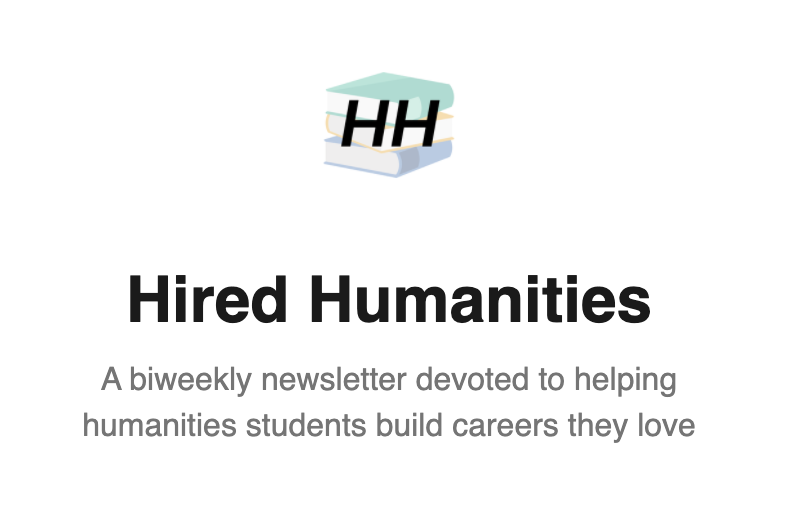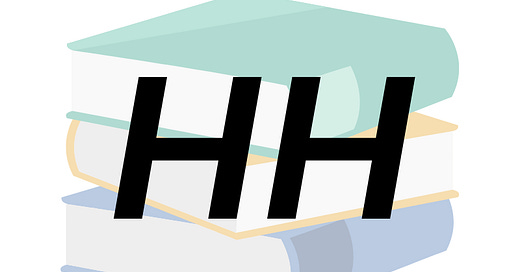13. starting historical research in a pandemic
thinking about reframing my approaches and "creative constraint"
Hi there! 👋 I’m Ida, and this is tiny driver, a newsletter about research, pedagogy, culture and their intersections. Thank you for being here. Reply anytime, I love hearing from you.
A lot has been happening in the world (understatement of the literal century). It's overwhelming. I feel like I've written this before. And I'm writing it again mostly to remind myself that this is not normal, and that this is why I need to have self-soothing practices in place. If you need some resources on taking care of your mental health during this time, check out the links at the top of last week's newsletter.
Apart from tiny driver coming out, last Monday also marked my first Zoom talk! In case you missed it & wanted to watch, I'll put the video below. Please excuse the Zoom awkwardness 😬—it was absolutely wild talking to a big television with a little camera at the top.
On Friday, I was also able to host an AMA (ask me anything) on learning & education through The Lounge by Girls' Night In. (A quick aside: GNI was the second newsletter I ever subscribed to [the first was Ann Friedman's], so they are partly to thank for tiny driver's existence 🤩!) In the spirit of paying it forward, I answered questions about grad school, freelance writing, and work/life balance. One of the best things that happened was that I got to meet a fellow American Studies PhD who does work that's similar to mine (shoutout to Sara A.)! We are having a zoom coffee later this week, and I couldn't be more thrilled!!! I guess you find your people in the unlikeliest of places, and I am so glad that I ~put myself out there~! 🤓
I also wanted to share some answers that I wrote during the AMA, just in case they'd be helpful for other folks! (Names redacted for privacy.) If you want to share these answers with a friend, feel free to send this newsletter along using the button below!
📚 On non-academic book recs for learning about US imperialism:

👩💻 On not getting too overwhelmed with grad school or a transition when you first start:

💭 On how to start thinking about where you want to go or what you want to do for grad school:


📩 I ended the AMA like this:

And I'd like to extend that offer to the tiny driver community as well.
If any of you ever have a question or need a sounding board, I'd love it if you'd drop me a line by replying to this email or leaving a comment. The bonus of leaving a comment is that other folks can weigh in as well! I'm also thinking in the next few months of having a similar AMA on tiny driver through Substack's discussion thread feature, so let me know if you'd find that to be of interest as well!
What I write.
This sounds insane, but I'm starting research on a new project. (Well, two projects, actually. But I'm only talking about one today.) It's a baby project—just an article. And it is very much in its fledgeling stages, so I don't want to say too much because I'm a little nervous about it (!!), but it broadly has to do with thinking about solidarities between Iranian and Black communities in the United States before 1979. So, it's a historical project. Which I am starting...in a pandemic...when no archives are open.
A quick caveat: I feel very, very privileged and lucky that this is not research I am doing for my dissertation now book manuscript. For all those grad students out there who have to embark on research during a pandemic, I am truly so sorry that your work has to be limited in such a way for the time being.
When I was first thinking about this project, and the research I'd have to do for it, I kept starting with the idea of the archive. With my past research, this is how I always started. I would see what archives were out there, apply to get funding to visit, go & take lots of pictures, come back, and then do the work of parsing through it all. So, naturally, that's how I began to think about this project too: what archives are out there? *writes list of archives* Are any of them open? *no* But surely if I email an archivist, then they could potentially scan some stuff for me??? *now you're just being ridiculous*
Also, as is usually the case with the things I am interested in, the archival materials are not yet digitized. Sometimes they're not even sorted through & categorized. (One archive I went to, for instance, had a collection of 19 boxes whose finding aid said: "Boxes 1-19: Material not yet described." 😅 I ended up making my own finding aid, and the whole process felt weirdly like Christmas.)
Needless to say, I had to re-evaluate what is possible and worth my time & effort. I realized that I also may have to reframe my research questions to fit these new circumstances. I think this was the biggest game changer for me—so much of the way that I was thinking about my approach to conceiving of the project itself had to do with my methodological approach. Once I acknowledged this and let go of the way I thought that I should be thinking about research, I felt more liberated. So, I decided to take stock in the possibilities of print culture, like newspapers. This past week, databases & the library search engine for databases became my best friend. And I'm not saying anything new, here. Historical research uses print culture often to contextualize and form arguments. But I think I personally was relegating newspapers to context, rather than re-framing it as a primary source-base. Typing "newspapers" into the database search rendered a lot of results that I previously had forgot about, like the "Black Historical newspapers" database. Through the process of collecting and parsing through articles on "Iran" in this database, I am finding questions and connections that are leading me in entirely new directions.
I've seen some stuff on the internet around the concept of "creative constraints," particularly in the realms of graphic design and organizational development. While I do think that the idea can't be plugged and chugged into historical methodologies, I do think that this conception can be embraced (for the time being) as a way of thinking about methodological innovation and the potential future of digitization—what we want and what we don't want.
What I consume.
In the Bookshop:
Currently Reading: Uncanny Valley by Anna Wiener + Freshwater by Akwaeke Emezi
On Deck: Luster by Raven Leilani
**New section in the bookshop: Alt-Ac Resources
I also received a little book mail on Friday that made me immensely happy: The Sense of Brown by José Esteban Muñoz, edited by Joshua Chambers-Letson and Tavia Nyong'o. For those who may not be familiar with his work, Muñoz was a performance studies scholar & professor at NYU whose work on queer of color critique has been foundational to so many fields. Personally, his work is critical to the ways that I think through Iranian diasporic formation and the ways in which it is publicly performed. His writing is thoughtful and all-consuming—I cannot stop reading his work once I've started. Unfortunately, he passed before he was able to complete his book on brownness & brown feeling. I remember reading his article, "Feeling Brown, Feeling Down," in grad school and feeling a sense of sadness—I wanted to know more about how he was conceiving of brownness, and it seemed that it wouldn't be possible. With the posthumous publication of his work, though, I feel renewed in my own work, and terribly saddened by the fact that he's not here to keep thinking alongside.
Item(s) of note.

My friend Emily C. started her own newsletter called Hired Humanities! Emily is a former Classics doctoral student turned tech industry worker, and she is all about helping folks with humanities backgrounds find careers that they love. Her newsletters come out every other Tuesday and deal with the transition to an alt-ac career, as well as very practical career advice for those interested in working in tech! Subscribe if that's something you'd be interested in learning more about, or follow her on twitter!


My other friend Randa T. was interviewed on the Ottoman History Podcast about her work! She writes about how race and gender are made meaningful for migrants during transit, and how sites outside of the United States contribute to racial and gender formations within the country. The podcast episode goes into one of her chapters on Zeinab Ameen, a migrant from late Ottoman Lebanon who traveled to the United States during the early 20th century. Follow her on twitter if you want to hear more too!
On being a journalist of color. Not just now, always.
I Miss Having Ideas (directly related to the "creative constraint" situation that I mentioned above.)
The pitfalls of anti-racism training. (Thank you to my friend Maj K. for sharing this article with me!)
A pup-date.
Prince Higgins is back in his office:

As always, thanks so much for reading through, and I'll see you in the next one!
Warmly,
Ida



